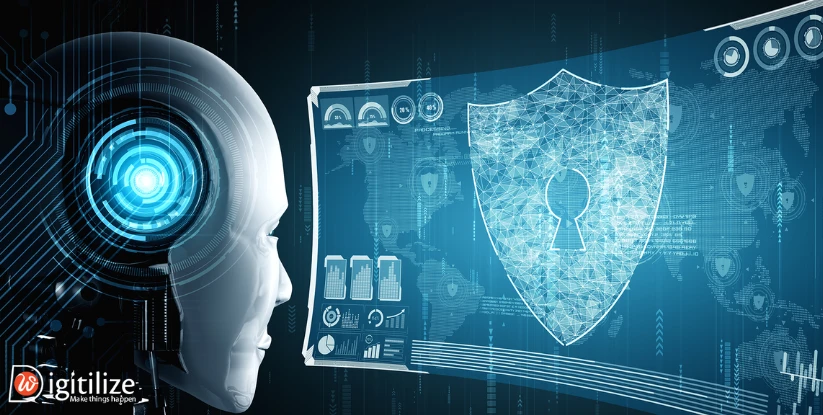Benefits and Drawbacks of AI in Cybersecurity
 Conventional cybersecurity methods are facing challenges from a rising number of cyberattacks and an increasing sophistication of these assaults. Cybersecurity experts are looking to artificial intelligence (AI) as a possible remedy as a result. AI can increase incident response times. Hence, cybersecurity by automating the identification and mitigation of cyber attack prevention with AI. That’s why it is crucial to discuss the benefits and drawbacks of AI in cybersecurity.
But enormous promise is accompanied by a complex set of difficulties. This essay explores the many benefits that AI-powered cybersecurity offers as it dives into the exciting world of this emerging field. By weighing the benefits and drawbacks of using AI in cybersecurity. We set out to understand the critical role this technology will play in determining the direction of our digital security environment.
Conventional cybersecurity methods are facing challenges from a rising number of cyberattacks and an increasing sophistication of these assaults. Cybersecurity experts are looking to artificial intelligence (AI) as a possible remedy as a result. AI can increase incident response times. Hence, cybersecurity by automating the identification and mitigation of cyber attack prevention with AI. That’s why it is crucial to discuss the benefits and drawbacks of AI in cybersecurity.
But enormous promise is accompanied by a complex set of difficulties. This essay explores the many benefits that AI-powered cybersecurity offers as it dives into the exciting world of this emerging field. By weighing the benefits and drawbacks of using AI in cybersecurity. We set out to understand the critical role this technology will play in determining the direction of our digital security environment.
What is AI?
The goal of the large discipline of computer science known as artificial intelligence (AI) is to create intelligent computers that are capable of performing tasks. Artificial Intelligence (AI) is a very vast field. So, its main goal is to create smart computers that can effectively carry out tasks that ordinarily call for human intellect. An extensive field of study called computer science does these kinds of jobs autonomously. Natural language processing, computer vision, voice recognition, speech recognition, and several more AI applications are among these challenges. When human intervention is not required, human intellect is often required. Expert systems, computer vision, speech recognition, and natural language processing are a few applications of artificial intelligence.What is cyber security?
Cybersecurity is the process of securing internet-connected devices, which involves safeguarding data, app development, and hardware from threats posed by cybercriminals. To prevent unauthorised access to data centres and other digital systems, organisations and companies employ this process. To recognise and stop system attacks, cyber security workers require the greatest cyber security training. We need a cyber security plan that is strong enough to be considered a competent security practice to defend against hostile attacks that can access, edit, delete, extract, or destroy the data of an organisation or particular systems and steal sensitive data. In order to stop cyberattacks that try to compromise or interfere with a system’s or device’s functionality, cybersecurity is the most crucial component.Importance of Cybersecurity

-
Aids in maintaining a reputation
-
Increases Output
-
Improved handling of data
-
Aids in preserving credibility and confidence
Advantages of AI in Cybersecurity

-
With time, AI becomes more intelligent.
-
Cut Down on Duplicate Procedures
-
Certification for Security
-
Instantaneous Threat Assessment
-
Avoid Phishing Attempts
-
Predicting Breach Risk
Drawbacks of AI in cybersecurity

-
AI Could Be Used to Commit Cyberattacks
-
Artificial Intelligence Is Fallible
-
Artificial Intelligence May Be Slanted
-
AI Is Not Perfect
-
Intricacy and Restricted Openness
FAQ
Frequently Asked Questions
When it comes to accuracy and efficiency, AI-based cyber security systems outperform conventional security solutions.
By constructing the necessary infrastructure to identify and neutralise threats and assessing networks for any weaknesses, security experts will defend companies against intrusions. Experts in AI are leading the way in data analysis.
Overall, cyber security occupations won't be eliminated by artificial intelligence. It will assist knowledgeable workers in enhancing their careers and increasing their productivity on a daily basis.
The use of artificial intelligence (AI) and machine learning (ML) technologies is one of the major developments in cybersecurity going forward.
Comprehending coding principles is crucial for cybersecurity experts to accurately decipher dangerous actors' actions on their networks.
Preventing data breaches, safeguarding private information, and discouraging cyberattacks are some of the advantages of data security. Additionally, data security aids in ensuring that, in the case of a security breach or attack, corporate activities will continue.

